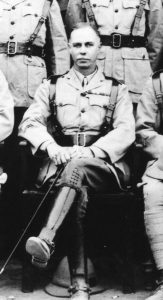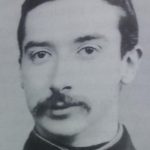Educated in the Isle of Man, and in Sandhurst, Maxwell Dopping Hepenstal was a lifelong soldier, serving in Waziristan, Africa and elsewhere in Crown forces, once forming part of the then kings Hunting Party.

Maxwell Edward Dopping Hepenstal in his army days
Also proficient in Japanese, he was sent to Japan and accepted there when it was still very much closed off to westerners.
On his retirement, he was active in the local Scout Troop, which added to themselves the reference as “Hepps Own”
Reference:
Comments
Personal Information
| Name | Maxwell Edward Dopping Hepenstal |
|---|---|
| Birth | 1872 in Duncan, BC, Canada |
| Death | 1965 in King’s Daughters’ Hospital, Duncan, Vancouver, British Columbia, Canada from Old age |
| Parents | |
| School 1 | King William’s College, Isle of Man |
| School 2 | Royal Military College, Sandhurst 1892 (schoolmate of Sir Winston Churchill) |
| Religion | Church of Ireland |
| Profession | Soldier |
| Event 1 | Second Lieutenant on 18 June, 1892 to the 1st Battalion Worcestershire Regiment. The regiment was posted to Poona, near Bombay |
| Event 2 | 9 October, 1893 2nd Lieutenant Dopping-Hepenstal was promoted to Lieutenant. |
| Event 3 | Appointed to the Indian Army on 25 July, 1896. He was attached as a wing officer to the 5th Infantry Hyderabad Contingent. Awarded the IGS 1895-1902 Medal with clasp; “Punjab Frontier 1897-98” for actions associated with the Mohmand Field Force . |
| Event 4 | On 28 March, 1897 Dopping-Hepenstal was attached to the 1st Battalion 3rd Gurkha Rifles (Queen Alexandra’s Own). The 1/3rd Battalion served as a support unit in the Tirah and adjunct operations of 1897. |
| Event 5 | On 10 July, 1901 Lieutenant Dopping-Hepenstal was promoted to Captain |
| Event 6 | In December of that year the 1st Battalion received orders to proceed to Tank on the North-West Frontier (Kabul Khel country) to form part of a supporting brigade to the Waziristan Blockade Force to put down raids by the Mahsud Waziris. The 1/3rd was in the second of three mobile columns working simultaneously in the territory. There was considerable hardship in this cold and inhospitable country. The regiment performed excellent work in scouting and piquet duty and Dopping-Hepenstal was awarded a clasp; “Waziristan, 1902-02”. |
| Event 7 | In 1907 Major Dopping-Hepenstal traveled to Japan for two years to study Japanese language. He was already versed in (Indian) native languages. While in Japan he learned the martial art of Judo…rare, in the West at this time. On his return he was qualified as an interpreter 2nd Class in Japanese. |
| Event 8 | On 18 February, 1908 Dopping-Hepenstal officially transferred to the 1st Battalion, 1st King George V’s Own Gurkha Rifles. |
| Event 9 | On 18 June, 1910 Captain Dopping-Hepenstal was promoted to Major. |
| Event 10 | The 1911 Delhi Durbar – The 1st Battalion King George V’s Own Gurkhas and the 1st Battalion Northumberland Fusiliers served as Guards of Honour, mounted in front of the Emperor’s reception tent. Major Dopping-Hepenstal was awarded 1911 Durbar Medal at the request of HM George V for his participation in the King’s shooting camp, Nepal. |
| Event 11 | WORLD WAR ONE: 18 March, 1915 Major Dopping-Hepenstal was wounded in the back of the neck by a shrapnel shell. He spent three weeks off the front line recovering from his wounds. |
| Event 12 | WORLD WAR ONE: On 19 April, 1915 Major Dopping-Hepenstal was wounded again. This time severely burned on the face and hands while rescuing French civilians and troops from a burning farmhouse. His injuries were serious enough to ship him back to England to convalesce for five months. Major Dopping-Hepenstal was awarded the Croix de Guerre by the French Government for this heroic deed. He returned to duty on 27 September, 1915. |
| Event 13 | On 16 May, 1916 Major Dopping-Hepenstal received the Distinguished Service Order, ‘immediate award’ for his conspicuous gallantry in leading his battalion in the attack at Bait Aissa under heavy rifle and machine-gun fire. This brilliant action captured 400 Turkish and German prisoners, six machine-guns and two field guns. |
| Event 14 | On 11 March 1918, Major Dopping-Hepenstal was promoted to Lieutenant Colonel. |
| Event 15 | Major Dopping-Hepenstal received the 1914-15 Star, War Medal and Victory Medal with Mentioned-in-Despatches |
| Event 16 | THIRD AFGHAN WAR: For his actions and service during these hostilities Lieut. Colonel Dopping-Hepenstal, D.S.O. was made a Commander of the British Empire (C.BE.) on 3 August, 1920. He was also awarded the IGS Medal 1908-1935 with clasp, Afghanistan NWF 1919. Additional clasps for service in punitive operations on the frontier includes: Waziristan 1919-21 and Waziristan 1921-24. |
| Event 17 | 6 May, 1935 Colonel Dopping-Hepenstal, C.B.E., D.S.O. was awarded the King’s 1935 Jubilee Medal. |
Half-Siblings
| Name | Birth | Death | |
|---|---|---|---|
 | Lambert Dopping Hepenstalasdasds | 3/8/1859 in Derrycassan, Co. Longford | Deceased |
Comments are closed, but trackbacks and pingbacks are open.